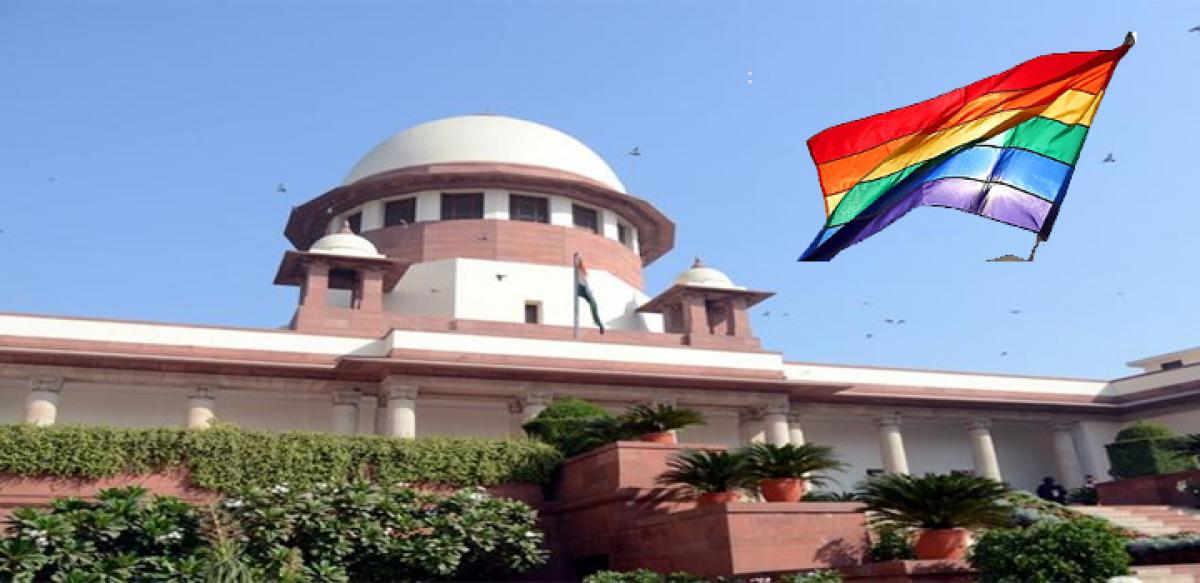Live
- ‘He is writing history’: Locals elated as PM Modi visits Prayagraj ahead of Mahakumbh
- TGRSA Formed to Revitalize Telangana's Revenue System and Safeguard Employees' Rights
- Days after ED raid, businessman and wife found dead in MP's Sehore
- Central Zone DCP Statement on Allu Arjun's Arrest
- Kinetic Green paves the way for Women’s Empowerment through innovative program and initiatives
- Russia hopes to keep military bases in Syria, Guterres urges deescalation
- ‘Pranayagodari’ review–Riveting village drama
- 6.7 kg Ganja Seized in Mangaluru Anti-Drug Crackdown
- Not only one Atul Subhash, there have been lakhs: PIL in SC on 'false' dowry cases
- Telangana CM A. Revanth Reddy Clarifies Comments on Allu Arjun Arrest, Stresses No Personal Grudge
Just In

The Supreme Court held out hope to LGBT (lesbian, gay, bisexual and transgender) communities by referring a curative petition to decriminalise homosexuality to a five-judge constitution bench. A bench comprising chief justice T S Thakur, justices Anil R Dave and A K Sikri heard in open court a curative writ by NGO Naaz Foundation and others seeking a relook at its verdict upholding the validity of
New Delhi: The Supreme Court held out hope to LGBT (lesbian, gay, bisexual and transgender) communities by referring a curative petition to decriminalise homosexuality to a five-judge constitution bench. A bench comprising chief justice T S Thakur, justices Anil R Dave and A K Sikri heard in open court a curative writ by NGO Naaz Foundation and others seeking a relook at its verdict upholding the validity of Indian Penal Code's section 377 that criminalises homosexuality.
A bench of three senior-most judges - Chief Justice T S Thakur, Justice Anil R Dave and Justice Jagdish Singh Khehar - referred the curative petition to the larger bench as senior counsel Kapil Sibal said the issue involved constitutional questions of far-reaching importance and must be heard by a five-judge bench.
"Since several constitutional issues are sought to be agitated in these petitions, let the matter be placed before the Chief Justice of India for posting to the five judges bench," ordered the bench after a brief hearing of the curative petition on Tuesday.
The court did not issue any notice, leaving it for the larger bench to take a call. At the outset, Sibal said the issue before the court concerned the most private right, the most precious right of the people - the sexual right and argued that if it is being exercised with consensus and within four walls, then no one should have any objection.
Faulting the December 12, 2013 apex court judgment and subsequent January 28, 2014 order in a review petition upholding the validity of section 377, he said the issue involved the rights of the gay people who are facing indignity and stigma by the judgment of a two-judge bench.
Telling the court that the issue before it was within four corners of the right to privacy under the constitution's article 19(1) guaranteeing freedom of speech and expression, Sibal said that it should be heard by a five judges bench. As senior counsel Anand Grover appearing for one of the eight petitioners seeking a relook at the apex court verdict sought to address the court, Chief Justice Thakur asked: "Is there anyone opposing it?"
The court was told that an organisation representing the church, the All India Muslim Personnel Law Board and a few individuals were opposing the plea. The apex court by its December 12, 2013 order and on the review petition on January 28, 2014, upheld the validity of section 377, finding no constitutional infirmity in the penal provision that criminalises homosexuality.
It had set aside the Delhi High Court's July 2, 2009 verdict reading down section 377 and decriminalising consensual sex between the adults of same gender. The then bench of Chief Justice P Sathasivam, Justice R M Lodha, Justice H L Dattu and Justice S J Mukhopadhaya (all retired since then) had on April 3, 2014, directed hearing of the curative petition in open court after they considered the plea by Naz Foundation in their chambers. The NGO had moved the Supreme Court seeking to cure "gross miscarriage of justice" in its judgment upholding the validity of section 377.

© 2024 Hyderabad Media House Limited/The Hans India. All rights reserved. Powered by hocalwire.com







